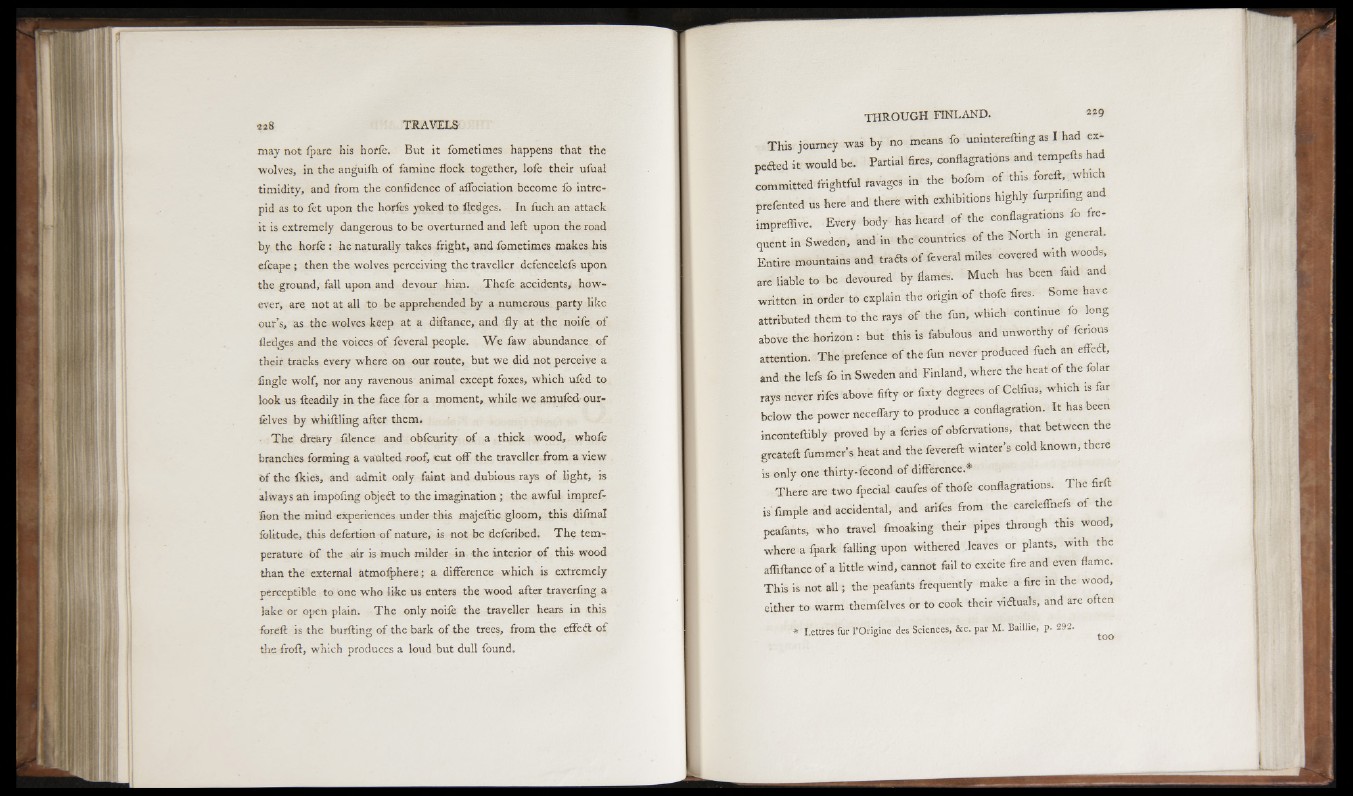
may not fpare his horfe. But it fometimes happens that the
■wolves, in the anguiih o f famine flock together, lofe their ufual
timidity, and from the confidence o f aflociation become fo intrepid
as to fet upon the horfes yoked to fledges. In fuch an attack
it is extremely dangerous to be overturned and left upon the road
by the horfe : he naturally takes fright, and ibmetimes makes his
efcape; then the wolves perceiving the traveller defencelefs upon
the ground, fall upon and devour him. Thefe accidents, however,
are not at all to be apprehended by a numerous party like
our’s, as the wolves keep at a diftancc, and fly at the noife o f
fledges and the voices o f feveral people. W e few abundance o f
their tracks every where on our route, but we did not perceive a
fingle wolf, nor any ravenous animal except foxes, which ufed to
look us fteadily in the face for a moment, while we amufed our-
felves by whiffling after them.
The dreary filence and obfcurity o f a thick wood, whole
branches forming a vaulted roof, cut o ff the traveller from a view
t>f the Ikies, and admit only faint and dubious rays o f light, is
always an impofing objeft to the imagination ; the awful impref-
fion the mind experiences under this majeftic gloom, this difmal
folkude, this defertion o f nature, is not be defcribed. T h e temperature
o f the air is much milder in the interior o f this wood
than the external atmofphere; a difference which is extremely
perceptible to one who like us enters the wood after traverfing a
lake or open plain. T he only noile the traveller hears in this
foreft is the burfting o f the bark o f the trees, from the effeit o f
the froft, which produces a loud but dull found.
This journey was by no means fo uninterefflng as I had ex-
pefted it would be. Partial fires, conflagrations and tempefts had
c o m m i t t e d f r ig h t fu l ravages in th e b o fom o f this foreft which
prefented us here and there with exhibitions highly furpnfing an
impreffive. Every body has heard o f the conflagrations o re
quent in Sweden, and in the countries o f the North in genera .
Entire mountains and Crafts o f feveral miles covered with woods
are liable to be devoured by flames. Much has been fa.d and
written in order to explain the origin o f thofe fires. Some have
attributed them to the rays o f the fun, which continue fo long
above the horizon : but this is fabulous and unworthy o f fenous
attention. The prefence o f the fun never produced fuch an effeft,
and the lefs fo in Sweden and Finland, where the heat o f the folar
rays never rifes above fifty or fixty d e g r e e s o f Celfius, which is far
below the power neceffary to produce a conflagration. It has been
inconteftibly proved by a feries o f obfervations, that between the
greateft fummer’s heat and the fevereft winter’s cold known, there
is only one thirty-fecond o f difference.*
There are two fpecial caufes o f thofe conflagrations. T he firft
is fimple and accidental, and arifes from the careleffnefs o f the
peafants, who travel fmoaking their pipes through this wood,
where a fpark falling upon withered leaves or plants, with the
afliftance o f a little wind, cannot foil to excite fire and even flame.
This is not a l l ; the peafants frequently make a fire in the wood,
either to warm themfelves or to cook their viftuals, and are often
* Lettres fur l’Origine des Sciences, &c. par M. Baillie, p. 2 9 2 .